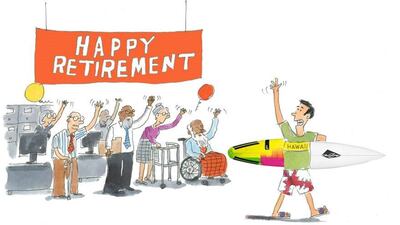Youth is wasted on the young, it’s said. But it seems to me that the maxim applies for the other end of the spectrum – surely retirement is wasted on the old.
Retire now and work later, is what I say.
To achieve this, hold onto the following thought: it’s all very well enjoying a tax-free status, but it’s wasted on those who haven’t put the tax-equivalent assets aside.
If you’re not doing this already, you’re probably blaming high expenses, low income and debt repayment as your barriers. Stop.
Now let's start again with this thought: with life expectancy getting longer, surely the way to live is to take a huge sabbatical half way through, and then get back to learning a skill or two, and earning once more later on in life.
If, that is you still need to earn.
Life expectancy is rising, as we all know. But as you think about planning for your retirement, it's worth thinking about your Health Adjusted Life Expectancy (Hale) a measure of your healthy years, as opposed to how old you'll be when you die.
In other words, your healthy years dictate what you're able to do as you age. The global average Hale at birth is around 63 years, according to the World Health Organisation. How far off is that for you? And is working half your waking hours until a stage when you're not able to enjoy the fruits of your labour really what you want out of life?
For me, it seems as if the ideal age (all other things considered) to retire would be around 40. By that age, people are typically wiser (in theory at least) and more cognisant of the need to look after their money and their health. They’re also more likely to have had a crack at building a traditional life, in terms of a career, a home and a family.
If you make the decision to change around this stage of life, you have more of a chance of seeing it through, having already experienced what it's like to be a wage-slave. Plus, if things have gone to plan, you should have had a few decades of earnings under your belt.
At this juncture it’s worth swapping the word "retirement" with "freedom from work". Retirement often has a negative connotation, implying being older and less able. Early freedom from work, by contrast, is the freedom to choose what you do with your life and your time, whether that includes working or not.
So what does it take to be free from having to earn money by 40 or thereabouts? I’ve been stalking a number of 30 and 40 year olds who have achieved this feat – and yes, they have a few things in common.
It’s about keeping as much money as they can, and then investing it. It’s important to really want to put money aside, because of what it does for you later. You’re going to need some serious resolve to to go with the flow and follow the spenders.
_____________
Read more:
Get on board to enjoy the ride with the Third Age Economy baby boomers
Generation Z looks to have the financial edge over millennials
_____________
Understanding the maths behind financial independence is key. The number to look at isn’t income. It’s what you spend on living. Rather, it’s what you don’t spend. Some early retirees blog about starting with a hundred dollars a month – and socking it into an index fund, or dividend yielding stock, which is great if you’re in your 20s when you start.
Others just ramped up their savings ratio – 50% and over is when it gets serious. If you’re spending 100 per cent of your income, you’ll never retire. If you don’t spend any of your income, you can retire right now.
A magic number to know is 25. Figure out what your life expenses will be for a year when you retire, and multiply it by 25. That's the lump sum you're aiming for, the assumption being that you can live off the 4 per cent the capital generates in interest. Your capital doesn't deplete, it just keeps giving.
A huge barrier to overcome is framing. If you view putting money away as a fun-sapping bore, I doubt you’ll stick with a saving habit. But if you think about it as your ticket to achieving your dreams -whether that’s touring the world in a VW camper can, or never having to clock into the office again - then you’ve got a better chance of making it happen.
Once you’re in the habit, invest what you save. Early retirees have passive income from dividend-yielding stocks, or from renting out property.
Now is the time to re-think, and readjust your lifestyle. How many times has a tax-free income in the UAE been cited as a great reason to work in the country? That’s fine, but much of that income is spent on upping your standard of living.
If you’re fortunate enough to enjoy accommodation costs paid by your employer, add this money straight away to your financial freedom pot. Someone I know did this for the three years he was posted in the UAE, and used it as a down payment for a flat when he went back home.
Tax-free income and perks will catapult you to financial freedom if you diligently put the money aside, and then invest it.
Are you disciplined enough to do this? Of course you are. Just focus on being able to do the things you love while your body is still up to the task.
Nima Abu Wardeh is a broadcast journalist, columnist and blogger. Share her journey on finding-nima.com

